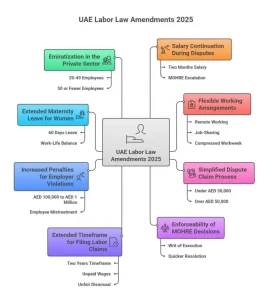The United Arab Emirates has always been at the forefront of innovation and modernization. The UAE labor laws are part of it. As an attractive destination, especially for talent across the globe. The labor market is evolving on a continuous basis. The goal is to meet the needs of employers and employees alike. The UAE government has introduced amendments to the labor laws. Specifically, in the year 2026. It aims to create a more flexible and competitive working environment.
These changes focus on enhancing workers’ rights. While providing more flexibility in employment arrangements. Ultimately, it boosts compliance standards across all industries. From an employee to an employer, understand how these new regulations will impact the labor market. A comprehensive guide to the UAE’s updated labor laws for 2026 has been written. Have detailed insights into what they mean for you. Let’s go and learn about it.
Overview of UAE Labor Law: Key Changes in 2026
The UAE labour program was established as Federal Law No. 8 of 1980. The law has undergone amendments over the years. The aim is to keep pace with global labor standards. Including the changing workforce dynamics. These updates are designed to ensure a fair and competitive labor market. This benefits employers and employees alike.
1. Salary Continuation During Disputes
Regulation around salary payments during employment disputes is an important amendment. As per the new law, employers must pay their employees’ salaries for up to two months. Meanwhile, employment disputes are being resolved. However, if a dispute is unresolved within 14 days, the MOHRE can escalate the issue to the court.
This change helps provide financial stability to employees. Especially during the dispute resolution process. Empowering them to seek justice, without fear of losing their income.
2. Flexible Working Arrangements
Workplace flexibility has been a growing trend globally. The UAE is no exception to it. The UAE Labor Law introduced greater flexibility in 2025. Related to working arrangements. Part-time and temporary employment options were introduced in 2019. For instance, the latest amendments allow employers to offer:
- Remote working options
- Job-sharing roles
- Compressed workweek schedules
Additionally, certain remote work provisions come with specific guidelines, including:
- Mandatory written agreements between the employer and the employee
- Defined working hours
- Data security protocols to ensure confidential information is protected
- Clear performance monitoring guidelines
These changes offer employees and employers more freedom. Allowing them to structure their work. In turn, this makes it easier to balance personal and professional lives. Maintaining productivity as a result.
Table 1: Comparison of Working Arrangements Before and After the Amendments
| Aspect | Before 2025 Amendments | After 2025 Amendments |
| Types of Employment | Full-time, part-time | Full-time, part-time, remote, temporary, job-sharing |
| Workplace Flexibility | Limited to full-time roles | Expanded to a remote, flexible, and compressed workweek |
| Written Agreements | Not mandatory for remote roles | Mandatory for all flexible working arrangements |
| Monitoring & Data Security | Varies per employer | Clear guidelines in place for remote work |
This change will not only increase job satisfaction but also help attract international talent seeking more flexible working environments.

3. Simplified Dispute Claim Process
The current year has streamlined the UAE’s approach to handling labor disputes. The MOHRE will make a binding decision on the matter if the value of a dispute claim is under AED 50,000. For disputes exceeding AED 50,000, MOHRE will still act as a mediator. However, they may refer the case to a competent court.
This update aims to speed up dispute resolution. Greatly helps employees and employers. While avoiding lengthy court processes and reaching fair outcomes more quickly.
4. Enforceability of MOHRE Decisions
Another significant update is the legal enforceability of MOHRE decisions. Decisions made by the Ministry are considered a “writ of execution”. This means they can be directly enforced by law. This strengthens the Ministry’s authority. On the other hand, it assures quicker resolution of disputes. As a result, it provides a more efficient legal framework.
5. Extended Timeframe for Filing Labor Claims
Workers had one year from the employment termination to file labor claims previously. The latest amendment extends this period to two years. This gives workers more time to seek redress for grievances such as:
- Unpaid wages
- Unfair dismissal, or
- Workplace violations.
For workers, this extended timeframe is a significant advantage. It provides them with the opportunity to pursue claims without the pressure of a short deadline.
6. Increased Penalties for Employer Violations
The UAE labour program has become stricter regarding employer violations. Employers can now face penalties. It could range from AED 100,000 to AED 1 million. However, it depends on the severity. These penalties have several violations. Including failure to comply with new labor laws/employee mistreatment.
Employers should be diligent about law adherence. This helps avoid these severe fines. Similarly, maintain a positive reputation in the market.
Table 2: Employer Violations and Associated Penalties
| Violation | Penalty Range |
| Failure to pay salaries during disputes | AED 100,000 to AED 1 million |
| Failure to comply with remote work regulations | AED 50,000 to AED 500,000 |
| Mistreatment or abuse of employees | AED 100,000 to AED 1 million |
This tightening of penalties emphasizes that employers stay compliant with labor laws. A way to create a supportive work environment for their employees.
7. Extended Maternity Leave for Women
The UAE has extended maternity leave for female employees. It has been extended from 45 days to 60 days. This change supports women’s rights. They can balance work and family responsibilities. Can have adequate time to recover and care for their newborns. Even without the stress of returning to work too soon.
8. Emiratization in the Private Sector
Emiratization remains a key goal for the UAE government. The labour-saving program UAE aims to increase the number of UAE nationals in the private sector. The rules around Emiratization have been revised in the year 2025:
- Private companies with 20-49 employees must hire at least 2 Emiratis.
- Companies with 50 or fewer employees must hire 1 Emirati.
Compliance failure will result in a financial contribution to the government. It is set at AED 108,000.
This push to include more UAE nationals in the workforce. Driving local talent development and strengthening the national economy.
9. Revised Non-Compete Clauses
Now, the non-compete clauses that employers impose on their employees must meet stricter conditions. Note that these clauses must be necessary. Their duration and scope must be reasonable. In addition, employees asking to sign non-compete agreements must be compensated. Right during the period the clause is in effect.
Employees have the right to challenge any non-compete clauses. Specifically, those that they feel are overly restrictive. The labor court has the authority. They can invalidate such clauses if they are deemed unfair or unreasonable.
How Employers Can Ensure Compliance
Employers must stay up-to-date with the evolving labor laws. Necessary to do so to avoid penalties and legal issues. To ensure compliance with the new labor laws, here’s what you need to do:
- Review Contracts: Update employee contracts to reflect changes. This could involve flexible working arrangements and salary continuation during disputes. Including maternity leave extensions.
- Policy Overhaul: Implement clear policies for remote working. Along with non-compete agreements and harassment prevention.
- Employee Awareness: Educate your workforce about their rights under the new laws. This provides smooth transitions and avoids conflicts.
- HR Systems: Leverage HR software and services. A way to track compliance and automate labor law processes.
Emiratisation Nafis: Acquire a Modern and Fair Workforce
The UAE’s updated labor laws for 2026 present a progressive shift. A direction shift toward a more flexible labor market. This is both employee-friendly as well. The UAE is positioning itself as a global leader in labor law reforms. It does so by increasing employees’ rights and simplifying dispute resolutions. Tried hard to encourage local employment through Emiratization.
To achieve all this is not easy; here comes the need for an expert consultancy. Acquire the services of Emiratisation Nafis in this regard. By having their back, employers can adapt to these changes quickly. This change enables them to remain competitive in the talent market. A the same time, they foster a positive working environment. Emiratisation Nafis helps employers comply with the law by embracing these updates. Resulting in enhancing employee satisfaction, retention, and productivity.
Staying compliant with the UAE labour saving program is more than just a legal obligation. Therefore, getting assistance from professionals is the need of the time. Avail of an opportunity to build a better, fairer workplace today!
FAQs for the UAE Labour Program
What does the Labor Program in the UAE mean?
The UAE government regulates the Labor Law. It covers labor permits, hiring agreements, and the rights and responsibilities of all workers in the private sector.
What is the primary goal of the UAE Labor Program?
The major purpose is to ensure that the labor market is fair and viable. It attracts the most talented candidates, as workers’ rights are protected, and both employers and employees have balanced obligations.
What are the rights secured with the Labor Program in the UAE?
Some of the most important protections are minimal employment standards, wage stability through WPS, leave rights, laws against discrimination, and fair dismissal.
How should the Labor Program contribute to Emiratisation?
It requires private companies to hire a certain number of Emiratis. They offer initiatives like Nafis to make native talent more competitive.
Where can businesses get the latest news on the UAE labor program?
Companies can get information from the official government website and from the MOHRE platform.



